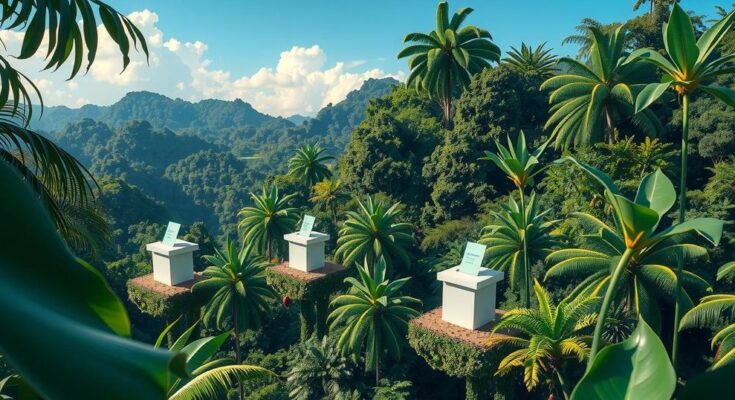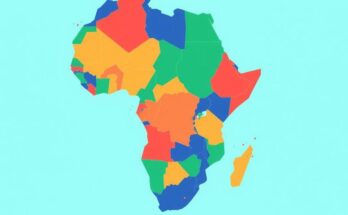Ecuador’s recent presidential elections reflect a nation grappling with multifaceted crises. Candidates Daniel Noboa and Luisa González both support extractivism that threatens the Amazon and Indigenous rights. The Indigenous movement, led by Leonidas Iza, plays a pivotal role in the electoral dynamics as the nation heads into a runoff election with significant implications for environmental and social justice.
On February 9, Ecuador held presidential elections amid significant political and economic turmoil. The upcoming runoff, set for April 13, could have profound implications for the health of the Ecuadorian Amazon. Both leading candidates, President Daniel Noboa and opposition figure Luisa González, support continued oil extraction in the Amazon, undermining Indigenous governance and enforcing political repression against their opponents.
Daniel Noboa, who garnered 44.6% of the votes, presided over a term characterized by heightened militarization and rampant human rights abuses. Luisa González, tied to former president Rafael Correa, received 44.02% of the vote but has a track record of advancing extractivism and persecution of dissenters, despite her platform’s focus on social policy expansion. Leonidas Iza, leading the Indigenous movement with 5.24% of the votes, is crucial in determining the election outcome, advocating for climate justice and opposition to extractive policies.
Since assuming office on November 23, 2023, Noboa’s presidency has been marked by a security crisis, resulting in widespread violence in Ecuador. His security policies have included harsh militarization strategies, yet homicides have surged, illustrating the failures of his approach. Human rights violations have escalated alarmingly, including documented forced disappearances and extrajudicial killings, which signal a troubling trend of state oppression.
Alongside the security challenges, Ecuador is experiencing an energy crisis exacerbated by prolonged drought and underinvestment in hydroelectric infrastructure. The resulting blackouts, sometimes lasting up to 14 hours, have inflicted severe economic damage. Noboa’s administration has sought closer military and trade ties with the United States, hinting at controversial constitutional reforms that may compromise Indigenous rights.
The current administration’s inclination toward foreign military presence raises alarms for Indigenous communities, as recent proposals could dismantle their rights to prior consultation and resistance. This coincides with the nation’s efforts to negotiate a Free Trade Agreement with Canada, further compromising local governance and exacerbating socio-environmental conflicts linked to mining activities.
The rise of illegal gold mining in the Ecuadorian Amazon, fueled by drug trafficking revenue reinvestment, intensifies socio-environmental challenges and violence. Criminal enterprises have expanded into various illegal trades, destabilizing Indigenous governance and posing a significant threat to ecological integrity. This dynamic reflects the critical need for stronger protections for the Amazon and its stewards amid escalating turmoil.
Luisa González represents a continuation of the Correísmo political legacy, which added layers of public investment and social service expansion while also fostering a culture of extraction and political polarization. Despite benefiting from a solid support base, González must navigate accusations of corruption and the lingering fears of an authoritarian regime that curtailed political pluralism during Correa’s administration.
The Indigenous movement, led by Iza, remains pivotal in the next election, having a rich history of influencing political change through mobilization. With both presidential candidates favoring extractive policies, the movement faces the dilemma of seeking neutrality, conditional support, or promoting a collective rejection of the current political landscape. Their organizing strength will be critical in shaping the elections and the future of the Ecuadorian Amazon.
Ecuador is at a critical juncture as it approaches a runoff election that could reshape its political landscape, particularly regarding the Amazon. Both major candidates maintain pro-extractivist stances, which threaten Indigenous rights and environmental integrity. The Indigenous movement, galvanizing public support against both candidates, has the potential to influence the outcome profoundly, underscoring the urgent need for a response to the ongoing crises impacting the region.
Original Source: amazonwatch.org




